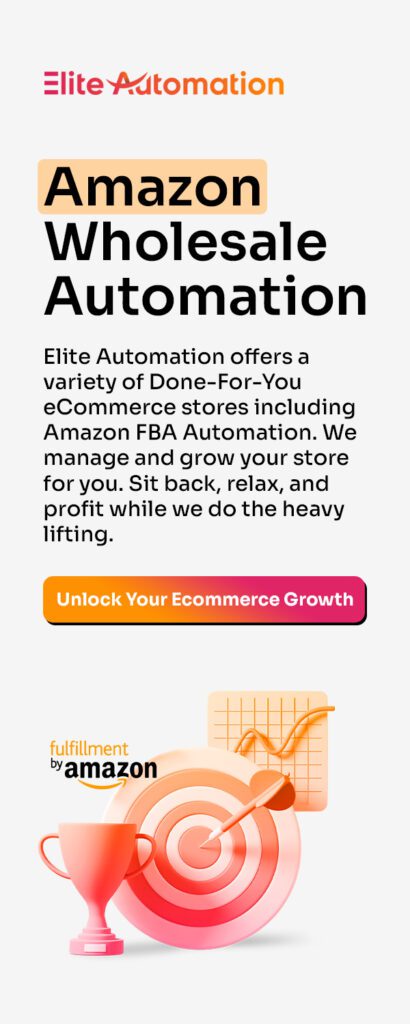Whether you plan to pay your mortgage, purchase a new house, or start another company, selling your Amazon FBA business can substantially impact your retirement plans or next steps in life in a positive way.
But not everyone sells their Amazon store does so for this reason. Selling an established Amazon business is a part of an initial plan for some. Perhaps they want to gain a massive profit and hand over the keys to someone else eventually.
While the reason for selling differs across the board, you must keep a few factors in mind to make the most out of your plan to sell your e-commerce store.

Make Sure Your Amazon Business Matches Buyers’ Criteria
Studies reveal that the average multiple for a sold Amazon business has risen to over 50x. That said, your business goals must align with those of the buyer. More and more aggregators, companies, and individuals want to buy established Amazon FBA businesses. This is good news for you. At the minimum, you must fit the following criteria:
- Your business must fall under a consumer category essential for everyday living
- The brand should be fairly well-known among Amazon consumers
- 70% of business sales come from Amazon FBA
- High-demand product variations should be available.
- Your store should have earned over $100k in net profit over the past year to make it worthwhile in selling
Think about your business’ profitability and how it grew since you launched the first product.
Can you show increased profits and an expanding customer base? What makes your brand stand out among the competitors? Will your products survive in the ever-evolving marketplace?
A buyer typically notices how your business is doing currently. But they also consider its potential down the line. They are doing their due diligence and do not skim over anything.
If you believe you’ve earned a prominent spot as an Amazon seller, you’ve met the basic criteria to attract a potential buyer.
Choose a Buyer that Aligns With Your Needs
Becoming a successful seller on Amazon is not an overnight process. It takes hard work, dedication, and consistency to reap the rewards of your efforts.
Therefore, your online business must have value you want to protect. While considering the buyer’s needs is essential, the potential buyer should also understand your needs as the seller and store founder.
If they fail to meet the criteria of an ideal buyer, you can pass on them as you’ll likely have more buyer options for your established e-commerce store.
If you’re looking for a reliable Amazon broker to help sell your business, we highly recommend opting for companies instead of individuals to ensure the safety of your transaction.
WebsiteClosers.com, Empire Flippers, and Flippa are some reputable sites that can help you out when selling your Amazon FBA business.

Selling Your FBA Business
All the business records you compiled so far will come in handy at this point. Make sure you review everything to determine its validity and authenticity.
So, selling, like building, doesn’t happen promptly. You’d need months to prepare financials and more before actually selling your store. Here’s how to make the entire process less daunting.
Increase Sales Revenue
The key is to boost sales to demonstrate an established business. This may require you to refresh your product listings, run Amazon PPC ads, and optimize your store for better results.
For instance, search for trending keywords and use them strategically in your product descriptions, titles, keywords and bullet points. Furthermore, ensure the description is easy to read and use bullets where possible.
Lastly, create a report outlining your revenue by season, product, and other similar factors. Be transparent about the times when sales were slow. Plus, do not forget to highlight how you maintained a steady revenue yearly.
Manage FBA Inventory
Ensuring your inventory is categorized and accurate is also critical. You can check this through the Manage Inventory page of your dashboard. Here you can sort your inventory, check on pricing and delete listings whenever needed.
This will help you remove old listings that might be cluttering your Amazon store.
Further, creating uniform listings improves the Inventory Performance Index. You receive alerts for the gray areas that need attention. For instance, you might need to reduce excess inventory to boost profitability.
Organize Financials
Buyers pay very careful attention to the financials. If there are any red flags, you could deter a buyer. It may be best for you to work with a professional when preparing your store’s financials. You must keep an authentic profit and loss record. This will help buyers understand your business’ profitability. Make sure you keep this data handy:
- Revenue made in last 2-3 years
- Average monthly net profit
- Monthly costs of goods sold and other expenses
- Total number of customers, conversions, and orders
- Value of your inventory
- Miscellaneous fees
- Age of your business (years)
Inaccurate records can be a huge turn-off for potential buyers, and they’ll not consider buying your seller account and Amazon store.

Prepare for the Change & Account Migration
Finally, list your seller account information, website domains, product listings, hosting accounts, and other valuable assets (email list and social media profiles) associated with your business.
Further, de-cluttering any customer lists by eliminating duplicates helps prepare for a smooth transition.
Don’t forget to communicate the transition to your loyal followers and previous customers. Make sure you plan this change strategically and show them gratitude for their contribution to your business. Let them know there is a new owner who will be taking things from here.
An Overview of What Buyers Look For In an Amazon Store
Knowing precisely what buyers look for in an Amazon store can help you prepare your store accordingly. Here’s how a potential buyer might assess your ecommerce store.
- Analyze traffic. A steady monthly income requires consistent, recurring traffic. Buyers will look if your e-commerce store (Amazon storefront or Amazon product listings) has traffic and if yes, is it organic or paid traffic?
- Assess risk. Does your business have the ability to thrive in the ever-evolving digital world? Will it continue to operate at the same level as now?
- Calculate longevity. A potential buyer will also determine the growth potential of your business. Your account will naturally be more credible and authentic if you’ve been in the industry for years.
- Check the financial details. What time and season contributed to business growth, and which led to losses? A buyer will review the financial information to observe spikes and drops in your business revenue.
- Figure out growth opportunities. Buyers also think about how they can contribute to the existing business. Do they have the skills to scale your current Amazon business?
Closing Notes
Because you worked tirelessly to establish an established Amazon business, you must know how to maximize its value when selling.
Make sure you fulfill the basic criteria and go above and beyond to meet the demands of a potential buyer. It’ll sell your asset at a better price, and your store gets assigned the value it deserves.


